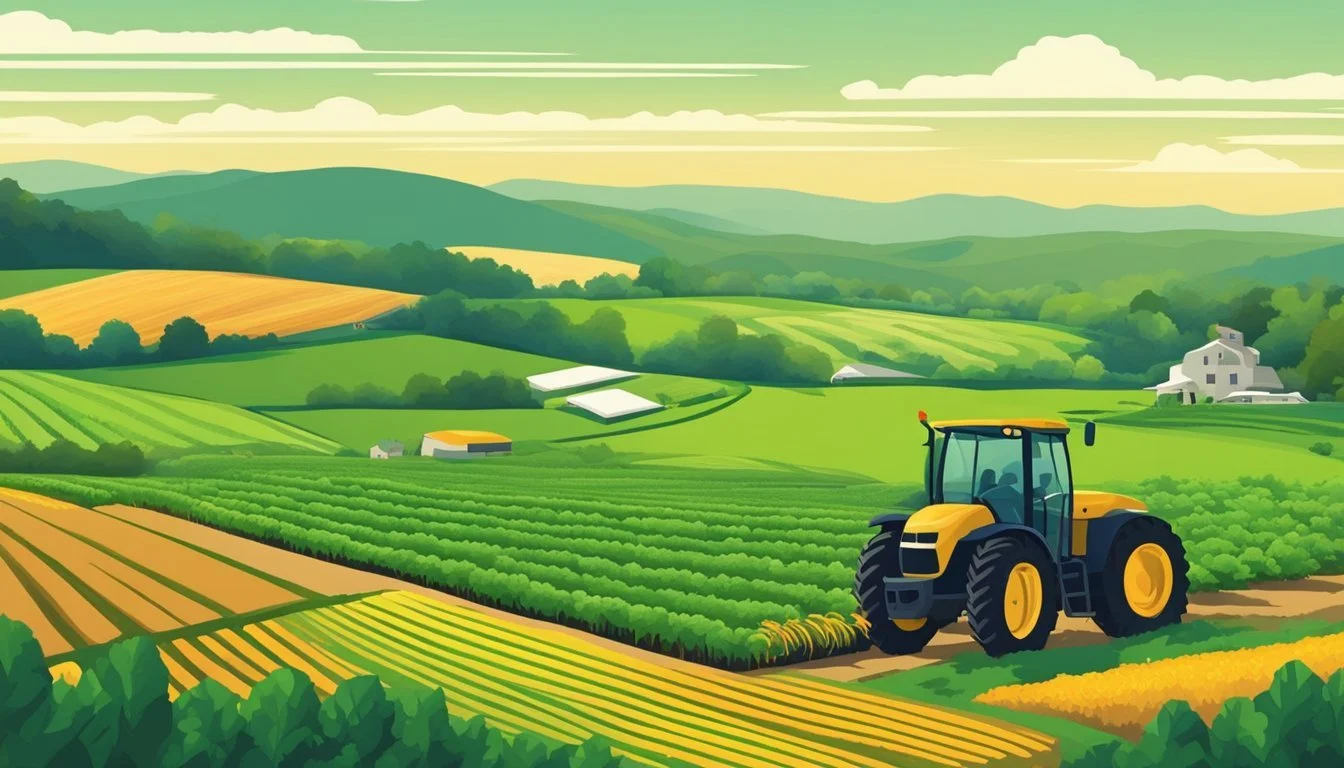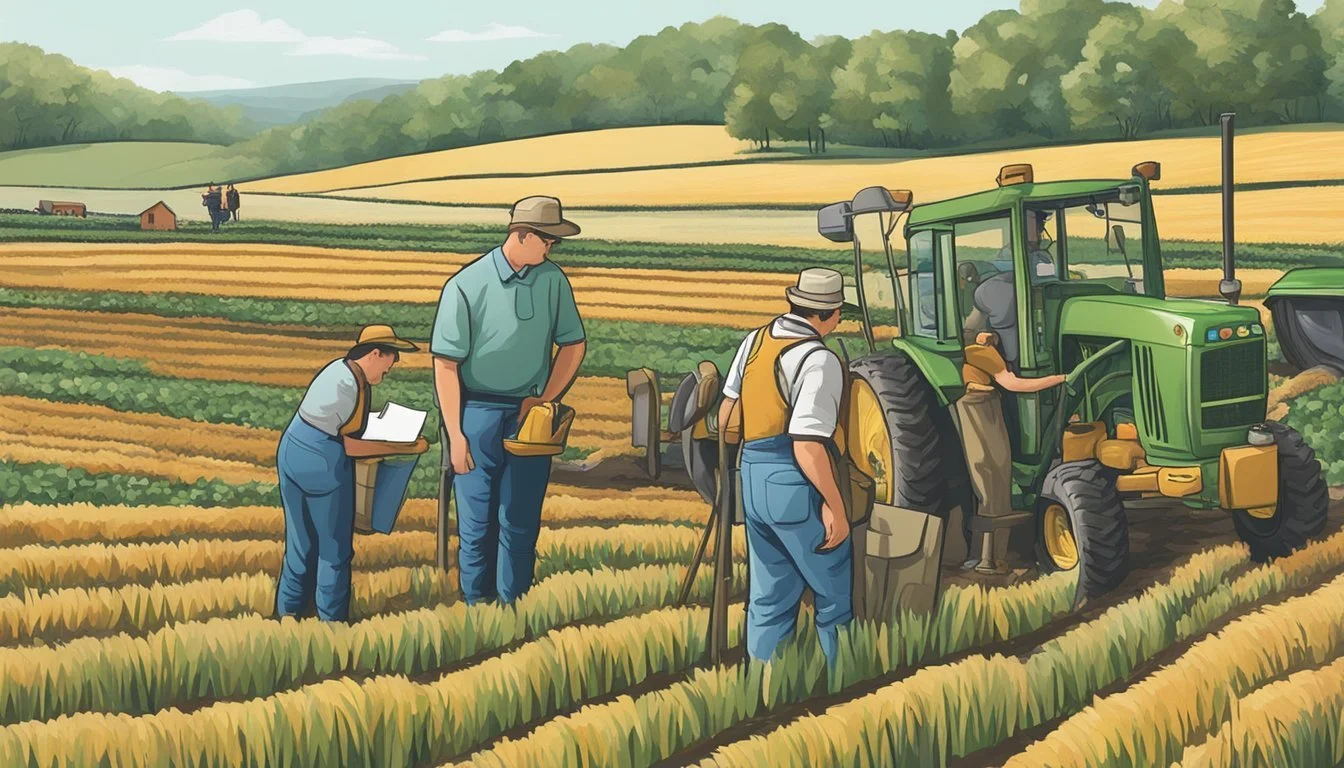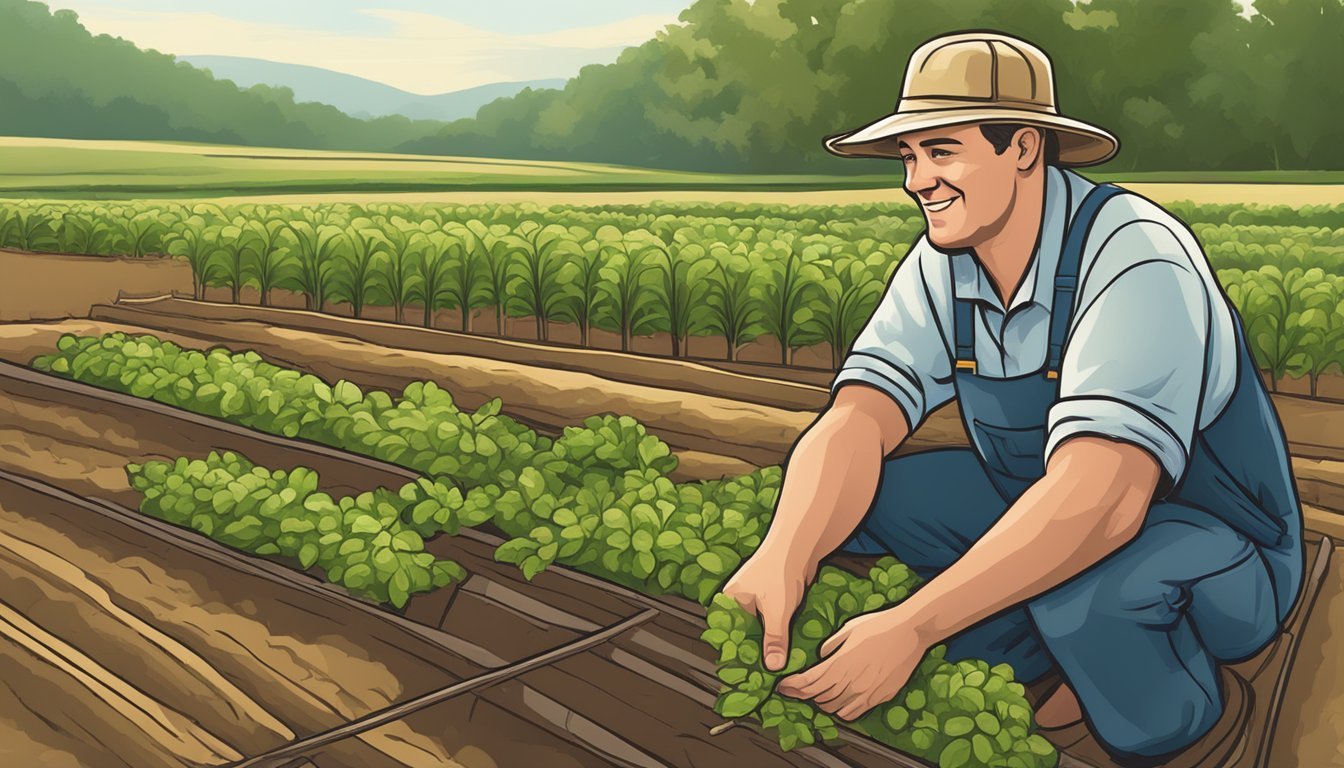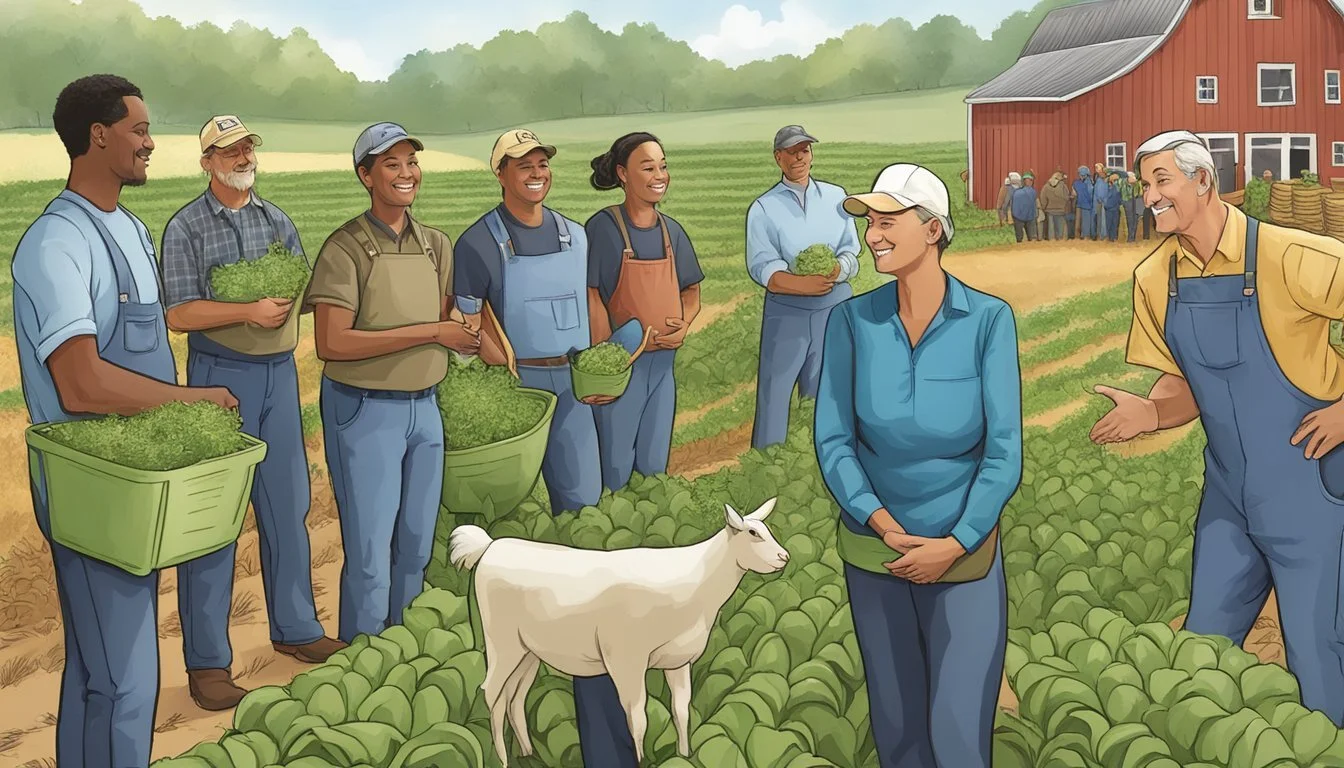Farming Grants Maryland
How to Secure Financial Aid for Agriculture
Farming remains a crucial industry in Maryland, contributing significantly to the economy and sustaining a vibrant rural community. In support of these agricultural endeavors, the state has established a suite of grant opportunities designed to assist farmers and rural businesses. These grants aim to bolster the agricultural sector by funding diverse projects, from conservation efforts to the development of infrastructure that supports farm and rural business growth.
The Maryland Department of Agriculture plays a vital role in administering conservation grants and loans that help farmers implement best management practices. These financial supports are a key resource in maintaining the health of Maryland's natural resources while ensuring compliance with environmental regulations. Programs such as the Maryland Agricultural Education and Rural Development Assistance Fund (MAERDAF) and the Rural Maryland Prosperity Investment Fund (RMPIF) underscore the state's commitment to its rural economy, offering a combined $9,000,000 in Governor's Fiscal Year 2024 Operating Budget for these initiatives.
Additionally, the Maryland Agricultural & Resource-Based Industry Development Corporation (MARBIDCO) targets specialty incentive grants to enhance local food systems and support farm and resource-based businesses. With a track record of funding over 1,283 projects with more than $101 million in direct financing, MARBIDCO's impact spans every county in Maryland. This financial support network for agriculture in Maryland indicates the state's dedication to fostering the growth and sustainability of its farming communities.
Overview of Farming Grants in Maryland
Maryland offers a variety of farming grants aimed at promoting agricultural development. These grants support diverse farming activities from small-scale urban agriculture to large rural farming operations. The Maryland Department of Agriculture plays a pivotal role in facilitating these grant programs, often in collaboration with federal agencies.
Conservation Grants are available for small-scale and urban farms to promote sustainable practices. Eligible candidates include individuals, agricultural businesses, and non-profit organizations. To qualify, the farm must produce goods resulting in at least $1,000 in sales or donations per year.
The Rural Maryland Council administers grant programs like the Maryland Agricultural Education and Rural Development Assistance Fund (MAERDAF) and the Rural Maryland Prosperity Investment Fund (RMPIF), with a significant budget allocation that underscores the state's commitment to its agricultural sectors.
Specifically targeting urban farmers, the Maryland Urban Agriculture Commercial Lending Incentive Grant (MUACLIG) meets the financing needs by providing incentives for commercial lender financing, aimed at developing or expanding urban agricultural enterprises.
Agricultural and rural business grants provide financial assistance for a variety of needs. They cover not only farming activities but also agricultural research, education, and community agriculture projects across Maryland, including Baltimore, Columbia, and more economically distressed communities.
Summary of Key Grants in Maryland:
Conservation Grants: For sustainable small-scale and urban farming
MAERDAF and RMPIF: Supports rural agricultural education and prosperity
MUACLIG: Assists urban farmers to access commercial loans
These programs are designed to bolster Maryland's agricultural economy, ensuring it remains vibrant and sustainable for future generations.
Eligibility Criteria for Grant Applicants
In Maryland, agricultural grants are designed to support the state's farmers and contribute to local food systems. Careful adherence to the eligibility criteria is essential for applicants to secure funding for their farming projects.
State Residency Requirements
Applicants for farming grants within Maryland must demonstrate that their operations are based within the state. This requirement ensures that the grant benefits the Maryland agricultural economy directly. Compliance with state residency is a fundamental criterion that must be met before considering the specific type of agricultural project.
Agriculture Project Types
Maryland farming grants cater to a diverse array of agricultural projects aimed at enhancing the state's agricultural output and sustainability. Eligible agriculture project types include:
Crop Production: Any horticultural, vegetable, or fruit product cultivated in Maryland. This extends to products whether raw or processed, such as canned, frozen, dried, or pickled.
Livestock and Dairy: Operations involving livestock, marine food products, poultry, eggs, or dairy.
Equine Operations: Activities related to equine care and management.
Applicants should ensure their agricultural projects fall within these categories to meet the criteria for funding consideration.
Types of Farming Grants Available
Maryland offers various grants designed to support farming practices, aid in conservation efforts, and enhance the value of agricultural products. These grants provide financial support to stimulate innovation, increase sustainability, and improve the agricultural infrastructure within the state.
Conservation Grants
Conservation grants in Maryland support practices that aim to preserve the environment and use natural resources wisely. The Rural Maryland Prosperity Investment Fund (RMPIF) allocates funds to promote rural prosperity, which includes environmental conservation projects among other initiatives.
Value-Added Producer Grant
The Value-Added Producer Grant (VAPG) is intended for farmers who want to transform their raw products into valuable commodities. For example, turning tomatoes into salsa. This grant helps farmers develop new product lines that add value beyond the raw material stage, enhancing their market potential and sustainability.
Cover Crop Program Grants
Through the Small Farm and Urban Agriculture Program, Maryland offers Cover Crop Program Grants, which are available in the spring and fall to support the planting of cover crops. Cover crops, such as grasses or legumes, are planted to improve soil health, reduce erosion, and manage pests and weeds.
Livestock Processing Equipment Grants
For farmers involved in the livestock sector, the Maryland Producer Cold Storage Grant Program is one initiative under the Maryland Agricultural & Rural-Business Industry Grant Programs (MARBIDCO). This grant assists with the purchase and installation of cold storage equipment, heightening the shelf-life and marketability of livestock products. It offers up to 50% matching funds, with a maximum grant award of $1,000.
Application Process for Maryland Farming Grants
The process of applying for farming grants in Maryland involves careful preparation of necessary documents and adherence to specific deadlines to increase the likelihood of funding approval.
Required Documentation
Farmers and agriculture-related businesses in Maryland seeking grants must compile a set of required documents to support their grant applications. The documents typically include:
Proof of agricultural activity: Applicants should provide evidence of producing farm products with a minimum annual revenue of $1,000 through sales or donations.
Business Plan: A detailed plan showcasing the viability and sustainability of the agricultural enterprise is often required.
Letter of Intent (LOI): For certain grants, such as those offered by the Rural Maryland Council, an LOI is the first step in the application process, which outlines the project and funding needs.
Submission Deadlines
Submission deadlines are crucial, and missing them can result in disqualification from the grant process. Adhering to the following deadlines is important:
Letter of Intent: Specific grants have a two-phase application process, starting with an LOI. The review board evaluates these LOIs to decide who moves to Phase 2, the final application.
Final Application: Grant programs have varying final application deadlines. For example, the Maryland Food and Agricultural grant application deadline was September 30, 2023. Therefore, applicants must verify the specific deadline for the grant they are applying for.
Applications are usually submitted through the appropriate channels, which can include an online portal or email, as stipulated by the grant-providing organization. Applicants should ensure that all submissions are made to the state of Maryland's designated grant application systems or email addresses, as failure to comply with submission guidelines may lead to disqualification.
Funding and Financial Resources
Maryland provides a wealth of funding and financial resources for farmers through various grants, loan programs, and reimbursement opportunities designed to support agricultural operations and sustainability efforts in the state.
Loan Programs
Maryland offers loan funds with competitive interest rates for farmers and agricultural businesses. Among the available lending resources, Maryland Vineyard/Hops/Orchard Fruit Planting Loan Fund targets those interested in planting fruit-bearing vines and trees, with maximum loan amounts reaching $100,000 and minimums at $15,000.
Reimbursement Programs
Farmers in Maryland can access conservation grants and reimbursement programs offered by the Maryland Department of Agriculture to assist with the implementation of best management practices on farms. These programs aim to safeguard natural resources while helping farmers comply with environmental standards.
Mini-Grant Opportunities
Entities like the Small Farm and Urban Agriculture Program offer mini-grants to support individuals and businesses engaged in small-scale farming or urban agriculture. Applicants must demonstrate a minimum production of a farm product leading to at least $1,000 in sales or donations annually to be considered eligible.
Agricultural Practices and Sustainability
Within Maryland, a diverse array of grant programs prioritize the enhancement of agricultural practices and sustainability. These initiatives aim to support soil and water conservation, sustainable farming practices, and urban farming endeavors, highlighting a commitment to preserving natural resources and bolstering water quality.
Soil and Water Conservation
Maryland's efforts to conserve soil and water resources are evident through various conservation grants. Farmers are encouraged to implement best management practices (BMPs) to maintain healthy soils and improve water quality. These may include techniques to reduce erosion, manage nutrients efficiently, and establish cover crops to enhance soil health.
Sustainable Farming Initiatives
Sustainable farming initiatives form a crucial component of Maryland’s agricultural policies. Grants through programs like the Maryland Agricultural Education and Rural Development Assistance Fund (MAERDAF) support projects that foster sustainable agriculture. These initiatives may spotlight sustainability practices such as crop rotation, integrated pest management, and renewable energy use on farms, aiming to create a balance between farming productivity and environmental stewardship.
Urban Farming Support
Urban farms in Maryland are recognized for their role in promoting sustainability and making fresh produce more accessible in urban centers. Support is provided to urban agriculture programs that generate at least $1,000 annually in sales or donations. Grants available for these urban farms often focus on improving water and power infrastructure, ensuring urban farms can thrive while contributing to the preservation of natural resources and enhancing water quality in urban settings.
Support for Diverse Agriculture
Maryland's agricultural support programs recognize the importance of variety in farming by offering specific grants and resources. These programs aim to foster a robust food system by encouraging diversification, sustainable practices, and addressing the unique challenges faced by urban growers.
Livestock and Dairy Programs
Maryland offers financial assistance targeted at livestock and dairy producers to promote sustainable practices and enhance production efficiency. This not only reinforces the dairy industry's foundation but also encourages the introduction of innovative breeding and management practices to maintain animal health and productivity.
Livestock Support: Assistance includes funding for enhanced feed quality programs, health management, and the adoption of advanced technologies.
Dairy Development: Grants support infrastructure improvements, product diversification, and direct market access to bolster this sector.
Crop Diversification Support
To equip farmers with the tools to expand beyond traditional crops, Maryland administers programs that aid in the cultivation of specialty crops, fruits, and vegetables. Its initiatives aim to support farmers exploring alternative crop opportunities, thus fostering a diverse agricultural environment.
Specialty Crops: Monetary support for research and promotion of fruits, vegetables, and other specialty crops.
Market Expansion: Assistance in accessing new markets and developing marketing strategies for diversified crops.
Organic Farming Expansion
Organic farming practices are gaining momentum, and Maryland provides support for farmers transitioning to organic agriculture. Resources are available to help urban growers and traditional farmers alike in adapting to organic methodologies, ensuring sustainable cultivation of produce.
Certification Assistance: Funds may be available to assist with the costs associated with obtaining organic certification.
Educational Resources: Training and development programs are offered to educate farmers on organic practices.
Local and Regional Resources
Local and regional resources in Maryland offer targeted support for agricultural enterprises, with a focus on both county-specific services and broader regional development initiatives that enhance the farming sector.
County-Based Agricultural Services
In Maryland, a variety of county-based agricultural services provide crucial support to local farmers. For instance, Anne Arundel, Calvert, and Charles Counties each have their respective branches of the University of Maryland Extension. These offices deliver essential information and assistance, including:
Educational programs: Localized training and workshops.
Technical advice: Guidance on best practices in agriculture.
This county-level involvement is critical for sustaining and developing local agricultural interests and providing farmers with the tools they need to succeed.
Regional Councils and Development Offices
Regional councils, such as the Rural Maryland Council and local Economic Development Offices, play pivotal roles in promoting agricultural and rural business growth. Notably, the:
Rural Maryland Council: Offers grants like the Maryland Agricultural Education and Rural Development Assistance Fund (MAERDAF) which funds capacity-building for rural nonprofits.
Economic Development Offices: Collaborate with entities like the Maryland Agricultural and Resource-Based Industry Development Corporation (MARBIDCO) to facilitate cost-share programs, enhancing the economic vitality of the agricultural sector.
These regional bodies are critical in providing financial and strategic support that helps to bridge gaps in resources for farmers and agricultural businesses within Maryland's counties.
Environmental Stewardship in Agriculture
Environmental stewardship in agriculture is pivotal for sustaining healthy ecosystems and promoting long-term productivity of farmlands. Maryland farmers are provided with both financial resources and expert guidance to integrate conservation practices that benefit the environment, particularly the Chesapeake Bay.
Conservation Practices
Maryland's conservation stewardship programs support farmers in implementing a range of conservation practices. These initiatives are designed to enhance water quality, reduce soil erosion, and promote wildlife habitat resilience. Emphasis is placed on practices that have a direct positive impact on the Chesapeake Bay and its watershed. For instance, through the Conservation Stewardship Program, participants receive payments for maintaining and enhancing their current conservation efforts and for adopting additional practices. A minimum payment of $1,500 annually is guaranteed over a five-year contract.
Farmers are encouraged to engage in sustainable practices such as:
Cover cropping: to improve soil health and reduce erosion.
Nutrient management: to minimize agricultural runoff.
Buffer strips: establishment of vegetative areas along waterways.
Chesapeake Bay Protection
The Chesapeake Bay and its watershed benefit from funds specifically aimed at protecting this crucial ecosystem. The Chesapeake and Atlantic Coastal Bays Trust Fund prioritizes projects that reduce nutrient and sediment pollution. This includes initiatives like tree planting on agricultural land, which is supported by grants of up to $50,000 to nonprofit organizations.
Efforts that address Chesapeake Bay protection typically focus on:
Forest buffers: planting trees adjacent to waterways to filter runoff.
Wetland restoration: reestablishing wetlands to absorb and filter pollutants before they reach the bay.
Stormwater management: implementing systems on farms to reduce the impact of stormwater on local waterways.
These targeted actions work in concert to not only bolster the health of the agricultural landscape but also safeguard the Chesapeake Bay for future generations.
Additional Farming Resources and Services
Maryland offers a rich array of resources and services aimed at fostering agricultural advancement and education. These resources, provided by various entities including universities, non-profit organizations, and government agencies, are essential for the growth and sustainability of the state's farming sector.
Research and Innovation
University of Maryland Extension (UME): A key institution that provides extensive research support, the UME conducts innovative agricultural research that is disseminated to farmers through various programs and services. This research focuses on improving agricultural practices, sustainability, and efficiency, benefiting Maryland's diverse agricultural community.
Non-Profit Organizations: Numerous non-profit organizations in Maryland offer grants and support, targeting small-scale and urban farms, among others. They facilitate research into conservation practices and fund projects that enhance farm productivity while ensuring environmental stewardship.
Agricultural Education
University of Maryland Extension (UME): UME also serves as an educational pillar for Maryland's agricultural community, offering courses, workshops, and mentorship programs. These educational initiatives cover a broad spectrum of topics, from marketing and business development to legislative navigation specific to the agricultural sector.
Agencies: Government agencies, such as the USDA Natural Resources Conservation Service (NRCS), provide funding opportunities aimed at educating producers about climate-smart conservation practices. By encouraging Maryland agricultural producers to apply for assistance, these agencies ensure that education goes hand-in-hand with the implementation of sustainable practices on agricultural land.
Outreach and Community Engagement
Outreach and community engagement initiatives within Maryland's agricultural sector play a crucial role in promoting social justice and establishing strong farming community networks. These efforts are essential in fostering collaboration among farmers, non-profit organizations, and industry stakeholders.
Social Justice and Agriculture
Maryland takes a proactive stance in intertwining social justice with agriculture. Entities like non-profit organizations are at the forefront, providing funding opportunities and support to underrepresented farmers. For instance, the conservation grants tailored for small-scale and urban farms demonstrate a commitment to inclusive growth. These grants are accessible to individuals and businesses with an annual minimum farm product sales or donations of $1,000, aiming to elevate operations that might otherwise lack resources.
Key Programs & Collaborations:
Maryland Agricultural and Resource-Based Industry Development Corporation (MARBidCo): It serves as a vital connector between the state and agricultural businesses, facilitating loans, grants, and other forms of financial assistance to ensure fair opportunities for all farm entrepreneurs.
Non-Profit Support: A spectrum of non-profit organizations strategizes grants focused on community engagement practices that bridge agricultural pursuits with social equity.
Farming Community Networks
The foundation of a thriving agricultural environment in Maryland is the strength of its farming community networks. Collaboration is central to these networks, with an emphasis on knowledge sharing and mutual support. Organizations like the Chesapeake Bay Trust shape grant-making strategies around community involvement, environmental education, and restoration projects that benefit the communal agricultural landscape.
Local Networks in Action:
Educational Workshops: Offering platforms for farmers to learn best practices, sustainability, and successful grant application processes.
Peer-to-Peer Support: Networking events that are designed to connect farmers, allowing them to share experiences, strategies, and form partnerships.
Marketing and Business Development
In Maryland, specific grants are available for farmers and agricultural businesses looking to enhance marketing efforts and develop business strategies. These grants are designed to support local farm food aggregation and the growth of farm and resource-based enterprises.
Value Added and Marketing Grants
The Maryland Agricultural & Resource Based-Industry Development Corporation (MARBIDCO) offers incentive grants focusing on value-added agricultural products. These grants assist Maryland farmers in expanding their marketing capabilities and reaching broader markets. They can fund a wide range of projects including:
Product diversification
Farm product processing
Packaging and labeling enhancements
To illustrate, let's consider a typical grant from MARBIDCO that might offer $10,000 to help a dairy farmer start producing artisan cheese, thereby adding value to their existing product line.
Business Planning and Strategy
For agricultural entrepreneurs who require assistance in business planning and strategy development, the Rural Maryland Council provides resources through grants offered via the Maryland Agricultural Education and Rural Development Assistance Fund (MAERDAF) and the Rural Maryland Prosperity Investment Fund (RMPIF). The funded projects under these programs may include:
Business plan development: Crafting detailed roadmaps for new or expanding agricultural businesses.
Agricultural business consultancy: Professional advice on operational, financial, and strategic aspects of running a successful agricultural enterprise.
University of Maryland Extension reflects such support with average grants of approximately $5,200, emphasizing the development of viable business plans for value-added agricultural production.










